Docx files for personal book: Verbum 9 part 1; Verbum 9 part 2; Verbum 9 part 3; Verbum 9 part 4; Verbum 9 part 5; Verbum 9 part 6; How to use the Verbum Lectionary and Missal; Verbum 8 tips 1-30; Verbum 8 tips 31-49
Reading lists: Catholic Bible Interpretation
Please be generous with your additional details, corrections, suggestions, and other feedback. This is being built in a .docx file for a PBB which will be shared periodically.
Previous post: Verbum Tip 8ag Next post: Verbum Tip 8ai
Apologies for the weird things that happened to the footnotes in copying the text over.
Psalms explorer
These resources have overlapping content:
- Witthoff, David, Kristopher A. Lyle, and Matt Nerdahl. Psalms Form and Structure. Edited by Eli Evans. Bellingham, WA: Faithlife, 2014.
- “List of Songs in the Bible” in Thompson, Jeremy, ed. Lists of Biblical People, Places, Things, and Events. Bellingham, WA: Faithlife, 2020.
- Parks, Jimmy. All the Songs in the Bible. Faithlife Biblical and Theological Lists. Bellingham, WA: Faithlife, 2021.
- Berlin, Adele. The Dynamics of Biblical Parallelism. Grand Rapids, MI; Cambridge, UK; Dearborn, MI: William B. Eerdmans Publishing Company; Dove Booksellers, 2008.
- Gerstenberger, Erhard. Psalms Part 1: With an Introduction to Cultic Poetry. Vol. 14. The Forms of the Old Testament Literature. Grand Rapids, MI: William B. Eerdmans Publishing Company, 1988.
- Gerstenberger, Erhard. Psalms Part 2, and Lamentations. Vol. 15. The Forms of the Old Testament Literature. Grand Rapids, MI: William B. Eerdmans Publishing Company, 2001.
- Neale, J. M., and R. F. Littledale, eds. A Commentary on the Psalms from Primitive and Mediæval Writers (multiple volumes) London; New York: Joseph Masters; Pott and Amery, 1868.
I have a minor complaint regarding this popular interactive – it does not include Biblical psalms that are outside the psalter. See J. W. Watts, “Biblical Psalms Outside the Psalter,” in The Book of Psalms: Composition and Reception, ed. P. W. Flint and P. D. Miller (VTSup 99; Leiden: E. J. Brill, 2005) 288–309. This is independent of the omission of Psalm 151 which is included in the NRSV ecumenical canon. Finally, it treats scripture as if chapter=psalm which the discrepancy in chapter divisions between the Masoretic and Septuagint texts show to be a false assumption.
The document of the interactive is internal under “about”. The documentation regarding the overview option:
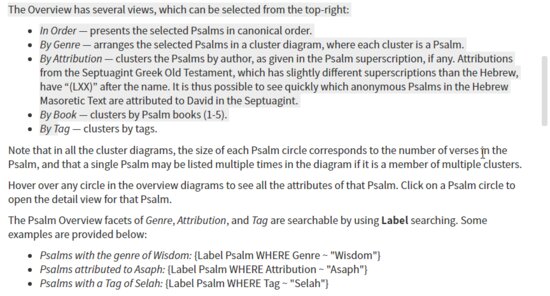
An example by genre:
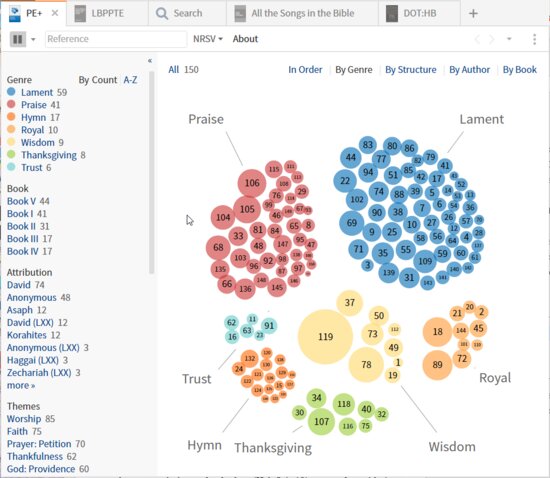
Remember that the size of the bubble reflects the number of verses in that chapter of the Psalms. Mouse over a bubble opens a popup which shows the detailed information about the psalm.
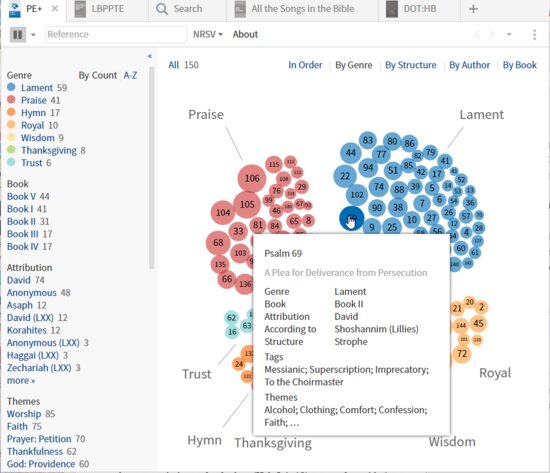
Clicking on the bubble, opens the second view of the psalm. This is also documented under “about” but is not easily captured in a single shot. Please open the documentation and read the entire documentation carefully. The detailed analysis will make little sense until you understand the Verbum definitions.
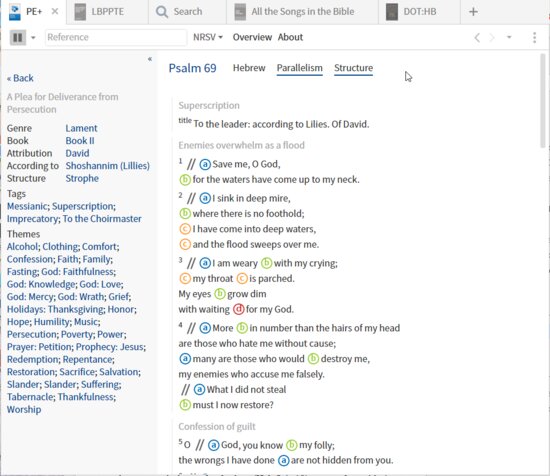
Note that the left panel is the complete form of the popup from the overview page. The right side is the text marked up to indicate the elements of the parallels etc. The structure is often more easily seen in the original Hebrew than in the English translation.
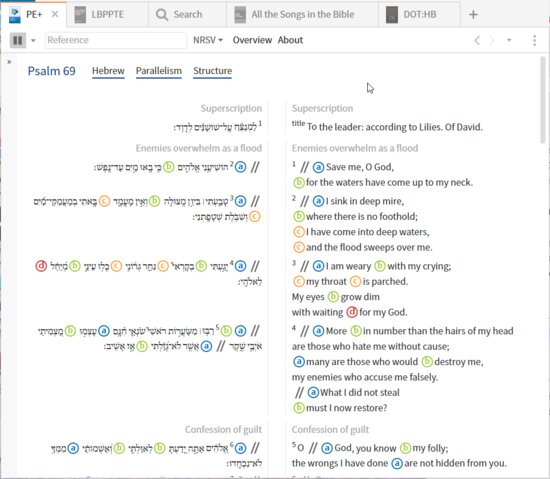
Other data: Berlin, Gerstenberger, Neale
Remember that in poetry, word choice is not simply a matter of meaning but also a matter of sound and rhythm. Consider this example of a sound pair:[quote]
|
|
|
|
|
|
|
|
|
|
Ps 69:13
|
ישיחו בי ישבי שער
ונגינות שותי שכר
|
|
|
|
The sitters at the gate [šʿr] discuss me;
[I am] the taunts of drinkers of strong drink [škr].[1]
|
|
|
|
|
|
To be honest, everything I know about Hebrew poetry I owe to Adele Berlin. Well, not quite – Gerstenberger has provided the framework for understanding the psalm structure from a formal / structural level i.e. the next level up.[quote]
Structure
|
|
MT
|
NRSV
|
|
I. Superscription
|
1
|
-
|
|
II. Invocation and complaint
|
2–5
|
1–4
|
|
III. Confession and petition
|
6–7
|
5–6
|
|
IV. Complaint
|
8–14ab
|
7–13ab
|
|
V. Petition
|
14cd–19
|
13cd–18
|
|
VI. Complaint
|
20–22
|
19–21
|
|
VII. Imprecation
|
23–29
|
22–28
|
|
VIII. Vow
|
30–32
|
29–31
|
|
IX. Blessing
|
33–34
|
32–33
|
|
X. Hymnic closure
|
35–37
|
34–36[2]
|
The interactive is a powerful starting point requiring serious study to understand the parallelisms of the Hebrew much of which is lost in translation. Because psalms are fundamental to the prayer and song of the church, it is important to continual increase one’s understanding of them. This includes understanding their use by the Church throughout history. John Mason Neale provides:[quote]
Psalm 69
Title: To the Chief Musician upon Shoshannim, a Psalm of David. LXX. and Vulgate: To the end, for them who shall be changed, a Psalm of David. Chaldee Targum: For praise; of the Captivity of the Sanhedrim, by the hands of David. Or, To the Supreme, for the Lilies, a Psalm of David.
Argument
Arg. Thomas. That Christ was given bitter gall and sharp vinegar to drink for our salvation. The Voice of Christ at the time of the Passion. This Psalm is to be read at the reading of the Prophet Jonah, and at the Gospel of S. John. The Voice of Christ to the Father, when He was suffering. Of the Passion of Christ, and the rejection of the Jews. A prayer for the Church.
Ven. Bede. To the end, every one knows, refers to Christ, “Who, by the very testimony of the Gospel, is about in this Psalm to narrate His Passion, by which believers shall he changed, putting off the old man, and putting on the new.
Throughout the Psalm Christ speaks in the form of a servant. In the first section He intreats that He may be saved by the Father, seeing that He is hated by the Jews without a cause. Save Me, O God, &c. In the second lie asks, on behalf of His members, that the hope of the faithful trusting in His Resurrection be not baulked, saying that He hath patiently borne whatever the ungodly laid on Him. God, Thou knowest My simpleness, &c. In the third place, He intreats that His prayer may be heard, so that His spotless conversation may be delivered from the mire of this world, saying that the Lord knoweth by what snares of the enemies He is beset, that He may arrive at the issue of His Passion, having overcome the peril. But, Lord, I make My prayer unto Thee. In the fourth place, through the power of His foreknowledge, He declares things to come, which may happen to His enemies. Let their table be made a snare to lake themselves withal, &c. Fifthly, in the form of a servant He calls Himself poor, whence He says that He will give thanks to His Father’s mercy, encouraging the faithful to trust in the Lord, Who hath delivered His Church from the adversity of this world, and hath provided therein for the eternal happiness of His Saints. When I am poor and in heaviness, Thy help, O God, shall lift Me up.
Syriac Psalter. Of David. Literally, when Sheba son of Bichri sounded with a trumpet, and the people refrained from going after David. And it is said to be a prophecy of Christ’s sufferings, and the reprobation of the Jews.
Eusebius Of Cæsarea. The sufferings of Christ, and the rejection of the Jews.
S. Athanasius. A Psalm in address alone.
Various Uses
Gregorian. Ferial. Thursday. Matins. [Maundy Thursday. I. Nocturn.]
Monastic. Ferial. Wednesday. Matins. [Maundy Thursday. I. Nocturn.]
Parisian. Friday. Matins.
Lyons. As Gregorian.
Ambrosian. Ferial. Monday of the Second Week. III. Nocturn. [Maundy Thursday. Matins.]
Quignon. Friday. Matins.
Eastern Church. Saturday. Nocturns.
Antiphons
Gregorian. Ferial. O Lord God, * haste Thee to deliver me. [Maundy Thursday. The zeal of Thine house hath even eaten me, * and the rebukes of them that rebuked Thee are fallen upon me.]
Monastic. Ferial. Alleluia. [Septuag. Seek ye after God, * and your soul shall live. Maundy Thursday. As Gregorian.]
Parisian. In Thy sight * are all mine adversaries: my heart hath waited for reproach, and misery.
Lyons. Ferial. Seek ye after God, * and your soul shall live. [Maundy Thursday. As Gregorian.]
Ambrosian. Ferial. Draw nigh unto my soul, * and save it. [Maundy Thursday. I am become a stranger * unto my brethren, even an alien unto my mother’s children.]
1 Save me, O God: for the waters are come in, even unto my soul.
2 I stick fast in the deep mire, where no ground is: I am come into deep waters, so that the floods run over me.
This Psalm, observes Cassiodorus, is the fourth of those which speak at length of the Lord’s Passion and Resurrection. (C.) And the fact of its being thrice cited in the New Testament in this sense, (A.) by the Apostles Peter, John, and Paul, does not permit us to doubt that its primary intention was Messianic prophecy. Save Me, O God. When Christ utters these words to His Father, (D. C.) He does not pray, as we must, to be delivered from sin, but from the sufferings of body and soul endured in His Passion. The waters are come in. And they may come in three ways: (P.) as a river torrent swollen with rains, as in a deep and muddy pool,* or as in a storm at sea. The first will denote the Jewish people, lashed into sudden fury by the secret instigations of the priests; the second the still, deadly hypocrisy of the Scribes and Pharisees; the third, the fierce wrath of kings and rulers. Applied to the servants instead of to the Master, these waters denote temptations and persecutions threatening the very life of the Church, or of single members thereof. Even unto my soul. Of the Church, (L.) as when a ship has sprung a leak, or been filled by waves, and is sinking; of a man, when the waters have risen to his lips, and threaten suffocation. I stick fast in the deep mire. Yes; for if He had not taken upon Him the nature of man, a creature of clay, (G.) He would have been free from danger and pain; but because He had stuck fast therein, joining His Godhead for ever to it, therefore He endured suffering. And He came into the mire in another sense when, laid in the tomb, (D. C.) He gave His Body to the earth. Where no ground is. The Vulgate has it, where there is no substance. And they take it variously. It may be the poverty of Christ in His human life, when He stripped Himself of His glory; or it tells us of His death, (A.) when His soul was parted for a time from the substance of His Body; or, (G.) again, it may refer to the utter exhaustion of His wounded Form as He hung dying on the Cross. Spoken in the person of sinners, (D. C.) the deep mire most fitly denotes the slough of carnal sin into which men sink ever deeper by mere continuance, without any fresh volition on their own part, (Cd.) where there is no ground, no certain point of stoppage, and no real or lasting pleasure. I am come into deep waters. Like Jonah, (A.) He suffered Himself to be cast into the sea, for the salvation of those in His ship, and after three days came forth again, after the floods ran over Him. And He says deep waters, (D. C.) as contrasting with the height from which He descended into them, when He came down from heaven; nay, denoting that He penetrated down to hell itself. (Ay.) This peril of deep waters, wisely observes the Carthusian, (D. C.) may well be that of high rank and office, so that the storm and noise of worldly cares and duties, overwhelm peace of mind, clearness of devotion, and guard over the heart. And when the ship of any human soul is in peril through the waves and storm, if Christ be there, the terrified mariner has but to call on Him; if He be not there, then let the waters be baled out with holy fear and confession of sin,* lightened with almsgiving, and steadied with the anchor of hope, till He come to save. (L.)[3]
Additional Faithlife coding
The Psalms are also, and more completely, included in Parks, Jimmy. All the Songs in the Bible. Faithlife Biblical and Theological Lists. Bellingham, WA: Faithlife, 2021.
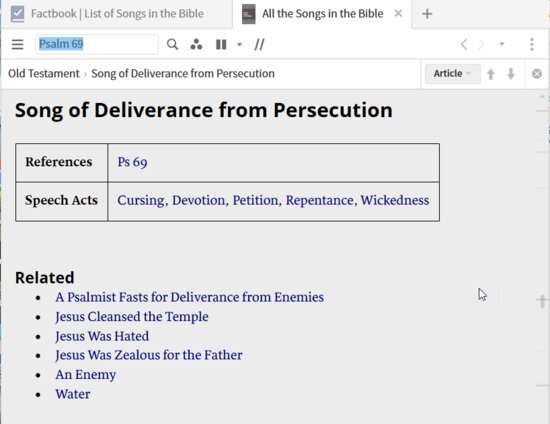
This resource has appendices of songs by singer, by speech act, and by instrument.
Factbook has a list of selected Songs in the Bible, the criteria for which I have been unable to determine.
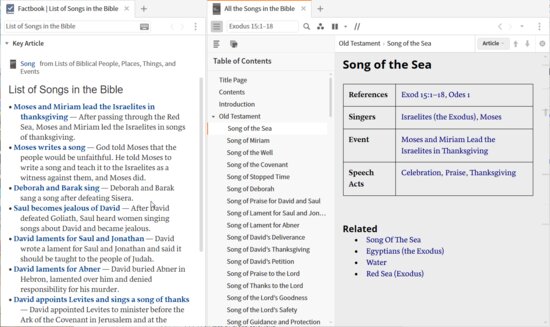
For the musicians among us who need the Latin names for the psalms, the Anglicans come to the rescue with any of the editions of the Book of Common Prayer Psalter. From The Episcopal Church. The Book of Common Prayer, 1979. New York: Church Publishing Incorporated, 2007.
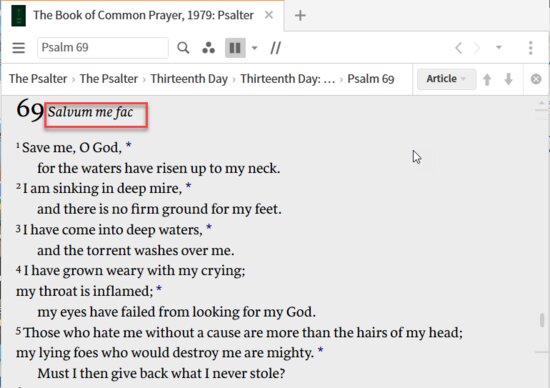
Psalters – metrical and chant
A partial list of psalters available in Verbum:[quote]
Major psalters
The Book of Common Prayer, 1662: Psalter
The Book of Common Prayer from the Original Manuscript: Attached to the Act of Uniformity of 1662. London; Edinburgh; Glasgow; Melbourne; Sydney; New York: Eyre & Spottiswoode, 1892.
The Book of Common Prayer, 1892: Psalter
The Book of Common Prayer: And Administration of the Sacraments and Other Rites and Ceremonies of the Church. New York: The Protestant Episcopal Church, 1892.
The Book of Common Prayer, 1928: Psalter
The Protestant Episcopal Church in the United States of America. The Book of Common Prayer and Administration of the Sacraments and Other Rites and Ceremonies of the Church. New York: The Seabury Press, 1976.
The Book of Common Prayer, 1979: Psalter
The Episcopal Church. The Book of Common Prayer, 1979. New York: Church Publishing Incorporated, 2007.
The Book of Psalms in metre close and proper to the Hebrew, smooth and pleasant for the metre, plain and easie for the tunes
Barton, William. The Book of Psalms in Metre Close and Proper to the Hebrew, Smooth and Pleasant for the Metre, Plain and Easie for the Tunes: With Musical Notes, Arguments, Annotations, and Index: Fitted for the Ready Use and Understanding of All Good Christians. Early English Books Online. London: Matthew Simmons for the Companie of Stationers, 1644.
The Book of Psalms, Vol. I & II: Bible Text
Perowne, J. J. Stewart. The Book of Psalms & II: Bible Text. Fifth Edition, Revised. Vol. 1. London; Cambridge: George Bell and Sons; Deighton Bell and Co., 1882–1883.
The Book of Psalms: Translation
Horsley, Samuel. The Book of Psalms: Translation. Fourth Edition. London: Longman, Brown, Green, and Longmans; F. & J. Rivington, 1845.
Certayne psalmes chosen out of the psalter of Dauid, commonlye called the.vii
Wyatt, Thomas, and John Harington. Certayne Psalmes Chosen out of the Psalter of Dauid, Commonlye Called The.vii. Penytentiall Psalmes, Drawen into Englyshe Meter by Sir Thomas Wyat Knyght, Wherunto Is Added a Prolage of [the] Auctore before Euery Psalme, Very Pleasau t [and] Profettable to the Godly Reader. Early English Books Online. Imprinted at London: In Paules Churchyarde, at the sygne of thee Starre, By Thomas Raynald. and i.e. for Iohn Harryngton, 1549.
t [and] Profettable to the Godly Reader. Early English Books Online. Imprinted at London: In Paules Churchyarde, at the sygne of thee Starre, By Thomas Raynald. and i.e. for Iohn Harryngton, 1549.
A collection of psalms and hymns
Wesley, John, and Charles Wesley. A Collection of Psalms and Hymns. Early American Imprints, 1639-1800; No. 4207. Charles-Town S.C.: Lewis Timothy, 1737.
Dauids Psalter, diligently and faithfully tra slated by George Ioye, with breif arguments before euery Psalme, declaringe the effecte therof
slated by George Ioye, with breif arguments before euery Psalme, declaringe the effecte therof
Joye, George. Dauids Psalter, Diligently and Faithfully Tra slated by George Ioye, with Breif Arguments before Euery Psalme, Declaringe the Effecte Therof. Early English Books Online. Antwerp: Maryne Emperowr, 1534.
slated by George Ioye, with Breif Arguments before Euery Psalme, Declaringe the Effecte Therof. Early English Books Online. Antwerp: Maryne Emperowr, 1534.
Doctor Watts’s imitation of the Psalms of David, corrected and enlarged.
Watts, Isaac, Joel Barlow, and John Trumbull. Doctor Watts’s Imitation of the Psalms of David, Corrected and Enlarged. Early American Imprints, 1639-1800; No. 18931. Hartford: Barlow and Babcock, 1785.
A Literal Translation of the Book of Psalms, Vol. 1
Jebb, John. A Literal Translation of the Book of Psalms. Vol. 1. London: Longman, Brown, Green, and Longmans, 1846.
A Literal Translation of the Book of Psalms, Vol. 2
Jebb, John. A Literal Translation of the Book of Psalms. Vol. 2. London: Longman, Brown, Green, and Longmans, 1846.
Mr. Richard Baxter’s paraphrase on the Psalms of David in metre with other hymns
Baxter, Richard. Mr. Richard Baxter’s Paraphrase on the Psalms of David in Metre with Other Hymns / Left Fitted for the Press by His Own Hand. Early English Books Online. London: Printed for Thomas Parkhurst ... and Jonathan Robinson .., 1692.
A new version of the Psalms of David
Barnard, John. A New Version of the Psalms of David. Early American Imprints, 1639-1800; No. 6820. Boston: N.E.: J. Draper, for T. Leverett, in Cornhill, 1752.
A new version of the Psalms of David, fitted to the tunes used in churches by N. Tate and N. Brady
Tate, Nahum. A New Version of the Psalms of David, Fitted to the Tunes Used in Churches by N. Tate and N. Brady. Early English Books Online. London: M. Clark for the Company of Stationers, 1696.
The Origin and Religious Contents of the Psalter: In the Light of Old Testament Criticism and the History of Religions, with an Introduction and Appendices
Cheyne, Thomas Kelly. The Origin and Religious Contents of the Psalter: In the Light of Old Testament Criticism and the History of Religions, with an Introduction and Appendices. London: Kegan Paul, Trench, Trübner & Co., 1891.
Original Psalms and Hymns
Sutcliffe, Joseph. Original Psalms and Hymns. London: Joseph Sutcliffe, 1832.
Our Own Hymn Book: A Collection of Psalms and Hymns for Public, Social and Private Worship
Spurgeon, C. H. Our Own Hymn Book: A Collection of Psalms and Hymns for Public, Social and Private Worship. London: Passmore & Alabaster, 1883.
A paraphrase upon the Psalms of David by George Sandys
Sandys, George. A Paraphrase upon the Psalms of David by George Sandys; Set to New Tunes for Private Devotion and a Thorough-Base for Voice or Instrument by Henry Lawes; and in This Edition Carefully Revised and Corrected from Many Errors Which Passed in Former Impressions by John Playford. Early English Books Online. London: W. Godbid for A. Roper, 1676.
A paraphrase upon the Psalms of David by Sam. Woodford
Woodford, Samuel. A Paraphrase upon the Psalms of David by Sam. Woodford. Early English Books Online. London: R. White for Octavian Pullein .., 1667.
Psalms and hymns composed and fitted for the present occasion of publick thanks-giving, October 24, 1651 by W. Barton
Barton, William. Psalms and Hymns Composed and Fitted for the Present Occasion of Publick Thanks-Giving, October 24, 1651 by W. Barton. Early English Books Online. London: William Du-Gard, 1651.
The Psalms and Hymns of Isaac Watts
Watts, Isaac. The Psalms and Hymns of Isaac Watts. Oak Harbor, WA: Logos Research Systems, Inc., 1998.
The psalms hymns and spiritual songs of the Old and New Testament, faithfully translated into English metre, for the use, edification, and …
Dunster, Henry, and Richard Lyon. The Psalms Hymns and Spiritual Songs of the Old and New Testament, Faithfully Translated into English Metre, for the Use, Edification, and Comfort, of the Saints, in Publick, & Private. Early American Imprints, 1639-1800; No. 33. Cambridge, Mass.: Samuel Green at Cambridg in New-England, 1651.
The psalms hymns and spiritual songs, of the Old and New-Testament
Mather, Cotton. The Psalms Hymns and Spiritual Songs, of the Old and New-Testament. Early American Imprints, 1639-1800; No. 817. Boston: B. Green, and J. Allen, for Michael Perry, under the west-end of the Town House, 1698.
The psalms hymns and spiritual songs, of the Old and New-Testament, faithfully translated into English metre
The Psalms Hymns and Spiritual Songs, of the Old and New-Testament, Faithfully Translated into English Metre. Early American Imprints, 1639-1800; No. 714. Boston: John Allen, and Vavasour Harris, for Samuel Phillips, at the Brick-Shop, near the Town-House, 1695.
The Psalms of David in meeter
Church of Scotland. The Psalms of David in Meeter: Newly Translated, and Diligently Compared with the Originall Text, and Former Translations, More Plaine, Smooth, and Agreeable to the Text, Then Any Heretofore.; Allowed by the Authority of the General Assembly of the Kirk of Scotland, and Appointed to Be Sung in Congregations and Families. Early English Books Online. Edinburgh: Evan Tyler, printer to the Kings most Excellent Majesty, 1650.
The Psalms of David in meeter with the prose interlined
Boyd, Zacharie. The Psalms of David in Meeter with the Prose Interlined / by Mr. Zachary Boyd. Early English Books Online. Glasgow: Printed at Glasgow by the heires of George Anderson .., 1648.
The psalms of David in meeter: by Mr. Zachary Boyd, preacher of God’s word
Boyd, Zacharie. The Psalms of David in Meeter: By Mr. Zachary Boyd, Preacher of God’s Word. Early English Books Online. Glasgow: George Anderson, 1646.
The Psalms of David in metre Newly translated With amendments
Barton, William, and Thomas Smith. The Psalms of David in Metre Newly Translated With Amendments. By William Barton, M.A. And Sett to the Best Psalm-Tunes, in Two Parts, Viz Treble and Bass; with Brief Instructions for the Understanding of the Same; Together with a Table of the Psalms, and Names of the Tunes to Each Psalm. By Thomas Smith. The Basses, with the Table, Are Placed at the Latter End of the Book. Early English Books Online. Dublin: printed by J. Brent and S. Powell, at the back of Dick’s Coffee House in Skinner-Row, and are to be sold by Peter Laurence at his shop in Bridge-Street, near the Old Bridge. Price bound 2s. 6d, 1698.
The Psalms of David set forth in English meeter set forth by Francis Rous
Rous, Francis. The Psalms of David Set Forth in English Meeter Set Forth by Francis Rous. Early English Books Online. London: James Young for Phillip Nevill .., 1643.
The Psalms of David translated from the Vulgat
Caryll, John. The Psalms of David Translated from the Vulgat. Early English Books Online. St. Germains: s.n, 1700.
The Psalms of David: Translated from the Septuagint Greek
Sheehan, Xenia, and Hierodeacon Herman Majkrzak, eds. The Psalms of David: Translated from the Septuagint Greek. Translated by Donald Sheehan. Eugene, OR: Wipf & Stock, 2013.
Psalms of the Faithful: Luther’s Early Reading of the Psalter in Canonical Context
German, Brian T. Psalms of the Faithful: Luther’s Early Reading of the Psalter in Canonical Context. Studies in Historical and Systematic Theology. Bellingham, WA: Lexham Press, 2017.
Psalms of the Return (Book V, Psalms 107–150): Studies in the Psalter, IV
Goulder, Michael D. The Psalms of the Return: Book V, Psalms 107–150. Vol. 258. Journal for the Study of the Old Testament Supplement Series. Sheffield: Sheffield Academic Press, 1998.
The Psalter of Dauid in Englyshe, purely and faythfully tra slated after the texte of Felyne
slated after the texte of Felyne
Joye, George. The Psalter of Dauid in Englyshe, Purely and Faythfully Tra slated after the Texte of Felyne: Euery Psalme Hauynge His Argument Before, Declarynge Brefely Thentente [and] Substance of the Hole Psalme. Early English Books Online. London: By Thomas Godfray, 1534.
slated after the Texte of Felyne: Euery Psalme Hauynge His Argument Before, Declarynge Brefely Thentente [and] Substance of the Hole Psalme. Early English Books Online. London: By Thomas Godfray, 1534.
The Psalter of David with titles and collects according to the matter of each psalm
Vaughan, Robert. The Psalter of David with Titles and Collects according to the Matter of Each Psalm. Early English Books Online. Oxford: Leonard Lichfield .., 1644.
The psalter of David with titles and collects according to the matter of each Psalme
Taylor, Jeremy. The Psalter of David with Titles and Collects according to the Matter of Each Psalme: Whereunto Is Added Devotions for the Help and Assistance of All Christian People, in All Occasions and Necessities. Early English Books Online. London: Printed for R. Royston .., 1647.
The Psalter or boke of Psalmes both in Latyn and Englyshe
Coverdale, Miles. The Psalter or Boke of Psalmes Both in Latyn and Englyshe. Wyth a Kalender, & a Table the More Eassyer and Lyghtlyer to Fynde the Psalmes Contayned Therin. Early English Books Online. London: Ricardus grafton excudebat. Cum priuilegio ad imprimendum solum, 1540.
The Psalter, or Psalms of David: In English Verse
Keble, J. The Psalter, or Psalms of David: In English Verse. Fourth Edition. Oxford; London: James Parker and Co., 1869.
Psalterium Americanum. The Book of Psalms, in a translation exactly conformed unto the original
Mather, Cotton. Psalterium Americanum. The Book of Psalms, in a Translation Exactly Conformed unto the Original. Early American Imprints, 1639-1800; No. 1946. Boston: in N.E.: S. Kneeland, for B. Eliot, S. Gerrish, D. Henchman, and J. Edwards, and sold at their shops, 1718.
Psalterium Carolinum the devotions of His Sacred Majesty Charles the First in his solitudes and sufferings
Stanley, Thomas. Psalterium Carolinum the Devotions of His Sacred Majesty Charles the First in His Solitudes and Sufferings / Rendred in Verse by T.S., Esq.; and Set to Musick for Three Voices, an Organ or Theorbo, by John Wilson, Dr. in Musick, Professor in Oxford. Early English Books Online. London: Printed for John Martin, James Allestry, and Thomas Dicas .., 1660.
The Revised Grail Psalms: A Liturgical Psalter
The Benedictine Monks of Conception Abbey. The Revised Grail Psalms: A Liturgical Psalter. Chicago, IL: GIA Publications, Inc., 2010.
The Roman Psalter
The Roman Psalter. Electronic edition. Collegeville, MN: Liturgical Press, 1999.
Sacred hymns Consisting of fifti select psalms of David and others, paraphrastically turned into English verse. And by Robert Tailour, set to be sung
Sandys, Edwin. Sacred Hymns Consisting of Fifti Select Psalms of David and Others, Paraphrastically Turned into English Verse. And by Robert Tailour, Set to Be Sung in Five Parts, as Also to the Viole, and Lute or Orph-Arion. Published for the vse of such as Delight in the Exercise of Music in Hir Original Honour. Early English Books Online. London: Thomas Snodham, by the assignment of the Company of Stationers, 1615.
Sacred poetry. Consisting of psalms and hymns, adapted to Christian devotion, in public and private
Belknap, Jeremy. Sacred Poetry. Consisting of Psalms and Hymns, Adapted to Christian Devotion, in Public and Private. Early American Imprints, 1639-1800; No. 28258. Boston: Printed at the Apollo Press, in Boston, by Joseph Belknap, no. 8 Dock Square, 1795.
The vvhole Psalter translated into English metre, which contayneth an hundreth and fifty Psalmes. The first quinquagene
Parker, Matthew, and Thomas Tallis. The Vvhole Psalter Translated into English Metre, Which Contayneth an Hundreth and Fifty Psalmes. The First Quinquagene. Early English Books Online. Imprinted at London: By Iohn Daye, dwelling ouer Aldersgate, beneath S. Martyns. Cum gratia et priuilegio Regiæ Maiestatis, per decennium, 1567.
The Whole book of Psalms as they are now sung in the churches, with the singing notes of the time and tune set to every syllable, made plain and easie
May, Thomas. The Whole Book of Psalms as They Are Now Sung in the Churches, with the Singing Notes of the Time and Tune Set to Every Syllable, Made Plain and Easie to the Understandings of All That Can Read by the Directions in the Latter Part of the Preface, Never before Done in England. Early English Books Online. London: Printed for R. Everingham for the Company of Stationers, and are to be sold by E. Brewster ... and S. Keeble .., 1688.
The whole booke of Psalmes collected into English meter by Thom. Sternh
Sternhold, Thomas. The Whole Booke of Psalmes Collected into English Meter by Thom. Sternh., Iohn Hopkins, W. Whittingham and Others, Conferred with the Ebrue with Apt Notes to Singe Them Withall; Set Forth and Allowed to Be Song in All Churches, of All the People Together before and after Mornyng and Euenyng Prayer, as Also before and after Sermons, and Moreouer in Priuate Houses for Their Godly Solace and Co[m]fort, Laying Apart All Vngodly Songes and Balades, Which Tend Onely to the Nourishyng of Vice, and Corruptyng of Youth. Early English Books, 1475-1640; 1828:2. At London: By Iohn Daye .., 1578.
The whole booke of Psalmes collected into Englysh metre by T. Starnhold, I. Hopkins, & others, conferred with the Ebrue, with apt notes to synge the[m] with al
Sternhold, Thomas. The Whole Booke of Psalmes Collected into Englysh Metre by T. Starnhold, I. Hopkins, & Others, Conferred with the Ebrue, with Apt Notes to Synge The[m] with Al; Faithfully Perused and Alowed according to Thordre Appointed in the Quenes Maiesties Iniunctions; Very Mete to Be Vsed of All Sortes of People Priuately for Their Solace & Comfort, Laying Apart All Vngodly Songes and Ballades, Which Tende Only to the Norishing of Vyce, and Corrupting of Youth. Early English Books Online. Imprinted at London: By John Day, dwelling ouer Aldersgate, 1562.
The whole Booke of Psalmes faithfully translated into English metre
Cotton, John, Richard Mather, John Eliot, and Thomas Weld. The Whole Booke of Psalmes Faithfully Translated into English Metre. Early American Imprints, 1639-1800; No. 4. Cambridge, Mass.: Stephen Day, 1640.
The whole booke of Psalmes with the hymnes euangelicall, and songs spirituall. Composed into 4
Sternhold, Thomas, John Hopkins, Thomas Tallis, John Dowland, Edward Blankes, and Thomas Ravenscroft. The Whole Booke of Psalmes with the Hymnes Euangelicall, and Songs Spirituall. Composed into 4. Parts by Sundry Authors, with Such Seuerall Tunes as Haue Beene, and Are Vsually Sung in England, Scotland, Wales, Germany, Italy, France, and the Netherlands: Neuer as yet before in One Volume Published. Also: A Briefe Abstract of the Prayse, Efficacie, and Vertue of the Psalmes. Early English Books Online. London: Thomas Harper for the Company of Stationers, 1633.
Exported from Verbum, 4:46 PM May 21, 2021.
Also see the Music for the Church of God Psalters page.
Search
There are two labels that carry relevant information as shown by the Information panel.
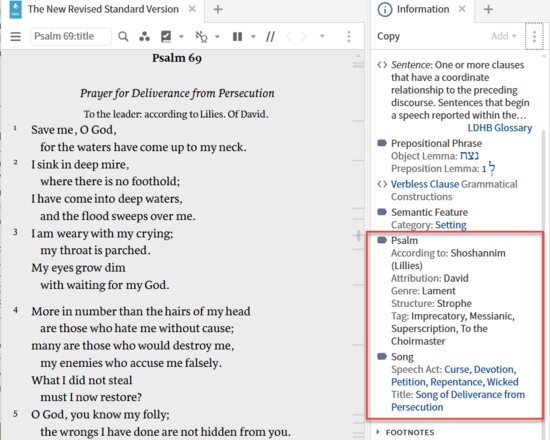
The corresponding searches are:
- {Label Psalm WHERE According to ~ "Shoshannim (Lillies)" AND Attribution ~ "David" AND Genre ~ "Lament" AND Structure ~ "Strophe" AND Tag ~ "Imprecatory" AND Tag ~ "Messianic" AND Tag ~ "Superscription" AND Tag ~ "To the Choirmaster"}
- {Label Song WHERE Speech Act ~ <Topic Curse> AND Speech Act ~ <Topic Devotion> AND Speech Act ~ <Topic Petition> AND Speech Act ~ <Topic Repentance> AND Speech Act ~ <Topic Wicked> AND Title ~ <Topic Song of Deliverance from Persecution>}
VTSup Vetus Testamentum Supplements
[1] Adele Berlin, The Dynamics of Biblical Parallelism (Grand Rapids, MI; Cambridge, UK; Dearborn, MI: William B. Eerdmans Publishing Company; Dove Booksellers, 2008), 109.
MT Masoretic Text
NRSV New Revised Standard Version
[2] Erhard Gerstenberger, Psalms Part 2, and Lamentations, vol. 15, The Forms of the Old Testament Literature (Grand Rapids, MI: William B. Eerdmans Publishing Company, 2001), 46.
C. Cassiodorus.
A. S. Augustine.
D. C. Dionysius the Carthusian.
P. Parez.
* Hugo Card.
L. Lorinus.
G. Gerhohus.
D. C. Dionysius the Carthusian.
A. S. Augustine.
G. Gerhohus.
D. C. Dionysius the Carthusian.
Cd. Balthazar Corderius.
A. S. Augustine.
D. C. Dionysius the Carthusian.
Ay. Michael Ayguan.
D. C. Dionysius the Carthusian.
* Hugo Card.
L. Lorinus.
[3] J. M. Neale and R. F. Littledale, eds., A Commentary on the Psalms from Primitive and Mediæval Writers: Psalm 39 to Psalm 80, vol. 2 (London; New York: Joseph Masters; Pott and Amery, 1868), 349–351.